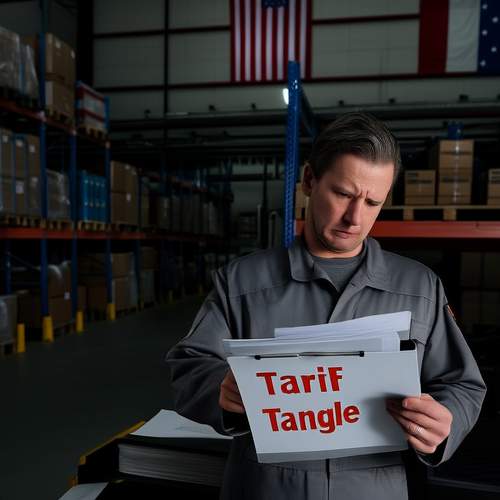In the fiercely competitive world of consumer goods, brand recognition is everything. Consumers rely on familiar packaging and logos to make quick decisions in the aisles of supermarkets. However, when those familiar designs are closely mimicked by store-brand products, it can lead to confusion and, in some cases, legal battles. This is precisely the situation unfolding between snack giant Mondelez and discount grocery chain Aldi.
Mondelez, the maker of beloved snacks such as Oreo, Triscuit, and Chips Ahoy, has filed a lawsuit against Aldi, alleging that the grocer’s store-brand snack packaging "blatantly copies" their iconic designs. The lawsuit, filed on May 27 in the federal court for the Northern District of Illinois, accuses Aldi of creating packaging that is "likely to deceive and confuse" customers. This legal action highlights the ongoing struggle between brand-name manufacturers and discount retailers over the boundaries of acceptable imitation.
The Accusations and Previous Incidents
Mondelez claims that Aldi has gone beyond mere inspiration and has directly copied the design elements of several of its popular products. The lawsuit specifically mentions Aldi’s peanut butter creme-filled cookies, chocolate chip cookies, and Thin Wheat crackers, stating that their packaging closely resembles that of Mondelez’s Nutter Butter, Chips Ahoy, and Wheat Thins. According to Mondelez, this similarity is not coincidental but a deliberate attempt to capitalize on the brand recognition and consumer loyalty that Mondelez has spent decades building.
This is not the first time Aldi has faced such allegations. Last December, an Australian federal court found Aldi liable for copyright infringement over children’s snacks packaging that resembled Hampden Holdings’ Baby Bellies puffs. This previous case underscores the ongoing challenge that discount retailers face in balancing the desire to offer affordable alternatives with the need to respect intellectual property rights.
The Legal Framework and Consumer Protection
Trademark law is designed to protect consumers from confusion and deception. Trademark lawyer Josh Gerben, who is not involved in this case, explains that the law aims to ensure that consumers can trust their recognition of brand names and packaging. "I can go to the store and reasonably assume that I recognize the name, and that’s who I’m buying from," Gerben says. However, when store-brand products closely mimic popular brands, consumers may inadvertently purchase a substitute, believing it to be the original.
The lawsuit filed by Mondelez argues that Aldi’s packaging practices threaten to "irreparably harm" their brands. By creating products that look strikingly similar to Mondelez’s offerings, Aldi risks diluting the distinctiveness and value of Mondelez’s trademarks. This, in turn, can lead to a loss of consumer trust and brand loyalty, which are critical assets for any company in the consumer goods industry.
Aldi’s Strategy and Market Position
Aldi, a German discount supermarket chain with over 2,400 locations in the United States, has built its business model around offering affordable alternatives to popular name-brand products. By selling store-brand versions at lower prices, Aldi attracts price-conscious consumers who are looking for value without sacrificing quality. However, this strategy walks a fine line between offering similar products and infringing on the intellectual property of established brands.
Gerben notes that such lawsuits are often decided on a case-by-case basis, with no clear "bright line test" to determine liability. Companies like Aldi must navigate the complex legal landscape to ensure that their products are distinct enough to avoid infringement while still offering the familiarity that consumers seek. "You want to fly close enough to the sun because you want the benefit of something," Gerben says, "but not too close."
The Broader Implications for Retailers and Manufacturers
The lawsuit between Mondelez and Aldi highlights a broader trend in the retail industry. As discount retailers continue to expand their store-brand offerings, they must be mindful of the potential for legal challenges. Mondelez is seeking not only monetary damages but also a court order to prevent Aldi from selling the allegedly infringing products. This legal action sends a clear message to other retailers that brand-name manufacturers are willing to defend their intellectual property vigorously.
For manufacturers like Mondelez, protecting their brand identity is crucial for maintaining market share and consumer loyalty. Brands invest significant resources in building their reputations and creating recognizable packaging. When store-brand products closely mimic these designs, it can undermine the value of those investments and create confusion in the marketplace.
For retailers like Aldi, the challenge is to offer affordable alternatives without crossing the line into infringement. This requires a careful balance between innovation and imitation. Retailers must ensure that their store-brand products are distinct enough to avoid legal issues while still providing the familiarity and quality that consumers expect.
Balancing Innovation and Imitation
The lawsuit between Mondelez and Aldi is a microcosm of the broader struggle between brand-name manufacturers and discount retailers. As retailers continue to expand their store-brand offerings, they must navigate the complex legal landscape to avoid infringing on established trademarks. For manufacturers, protecting their brand identity is essential for maintaining market share and consumer loyalty.
In this case, Mondelez is taking a stand to protect its intellectual property and ensure that consumers are not deceived by closely mimicked packaging. The outcome of this lawsuit will have significant implications for both parties and may set a precedent for future disputes in the retail industry. As the legal battle unfolds, it serves as a reminder of the delicate balance that retailers must strike between offering value and respecting the rights of brand-name manufacturers.
For consumers, the takeaway is clear: while store-brand products can offer significant savings, it is essential to remain vigilant and ensure that you are purchasing the product you intend to buy. In a world where packaging and branding play such a crucial role, the line between inspiration and infringement is often thin.

By Benjamin Evans/Jun 3, 2025

By Samuel Cooper/Jun 3, 2025

By Lily Simpson/Jun 3, 2025

By Eric Ward/Jun 3, 2025

By George Bailey/Jun 3, 2025

By Victoria Gonzalez/Jun 3, 2025

By Noah Bell/Jun 3, 2025

By Rebecca Stewart/Jun 3, 2025

By Grace Cox/Jun 3, 2025

By John Smith/Jun 3, 2025

By Emma Thompson/Jun 3, 2025

By Victoria Gonzalez/Jun 3, 2025

By George Bailey/Jun 3, 2025

By Samuel Cooper/Jun 3, 2025

By Michael Brown/Jun 3, 2025

By Grace Cox/Jun 3, 2025

By Megan Clark/Jun 3, 2025

By Noah Bell/Jun 3, 2025

By Emma Thompson/Jun 3, 2025

By Rebecca Stewart/Jun 3, 2025